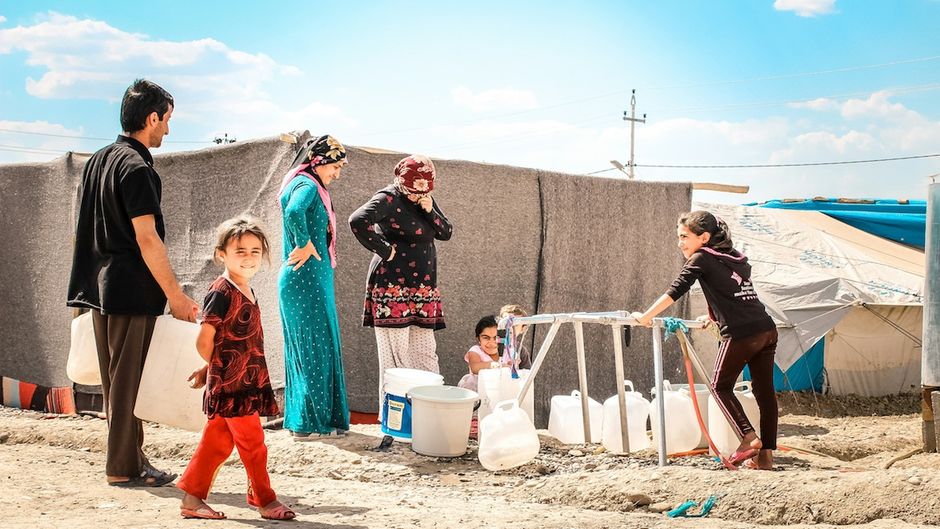A world that normalises its refugees
World Refugee Day was marked by increasing numbers of displaced people (120 million) and a limited political response. “No NGO can stop a war”, says an evangelical group.
Protestante Digital · BARCELONA · 21 JUNE 2024 · 15:02 CET

Another 20th of June marked by the celebration of World Refugee Day, full of speeches advocating the defence of the rights of those who have been displaced either by war, the climate crisis, lack of opportunities or religious persecution.
But another 20th of June marked by the reality of figures that continue to increase.
The United Nations High Commissioner for Refugees (UNHCR) reports that by the end of May 2024, 120 million people were forcibly displaced from their homes, which is 1.5% of the world population.
The UNHCR warns of a trend that has continued to grow over the last 12 years, affecting 1 in 69 people today (1 in 125 a decade ago).
Taking into account those who do not leave their country but move to other regions within it, there are 43.4 million refugees worldwide.
According to UNHCR, that figure has tripled in the last decade. Moreover, in 2023 only 1.1 million refugees were able to return home.
“Behind these stark and rising numbers lie countless human tragedies. That suffering must galvanize the international community to act urgently to tackle the root causes of forced displacement”, said UNHCR head, Filippo Grandi.
“Most of them do it out of necessity”
The European Union ended 2023 approving a long-awaited migration agreement that has not convinced NGOs and social entities that work with refugees and displaced people.
Even with the agreement already approved, some EU countries kept bilateral agreements previously signed with other non-EU countries, like Italy with Tunisia. Others signed new deals even after the new legal framework was approved, such as the agreement between the Italian government and Albania, which was initially banned by the Albanian judiciary.
“Migration is not a new phenomenon, it has always happened. The majority leave their homes out of necessity, because the circumstances in which they live become unbearable”, says NGO Alianza Solidaria.
The social entity of the Spanish Evangelical Alliance works with refugees “who stay close to their place of origin” in Lebanon and other countries.
Most of them are “Syrians displaced by a fratricidal war that has been going on for over 13 years, a population without the skills, abilities or economic resources to migrate any further. And above all, stateless children, invisible, who do not exist for anyone and without access to the most important thing for a child to have a future, education”, they lament.
They acknowledge that “no NGO can stop a war. That is up to the states to do”, but “it would be good if they would facilitate our work, as we help the displaced population to cope with their situation and cover at least some of their basic needs”.
“We also help to prepare future generations, to make those invisible children visible, so that they can be useful to their families and communities when the time comes for a safe return to their country of origin”, they add.
Food insecurity
A problem that has worsened in recent years, especially among forcibly displaced populations, is that of food insecurity.
Another NGO, World Vision, talks about what it calls “ration cuts”, which is the title of one of its latest reports, which analyses the interruptions in the distribution of humanitarian aid and its effect, especially among displaced people and refugees.
According to the entity, up to 68% of people dependent on humanitarian aid, who have suffered these intermittent cuts in their access to it, report that a member of their family had gone to bed hungry in the last few weeks due to food shortages.
“Hunger isn’t just killing people through malnutrition, but also through mental illness”, explained World Vision's director of global hunger response, Mary Njeri.
Alianza Solidaria identifies the same trend and says that “survival is a problem [among displaced people and refugees] because food insecurity has intensified in the last five years, reaching levels of severe poverty for 90% of the refugee population”.
In addition to this, there is constant exposure to violence affecting both adults and children. World Vision found that 41% of refugees feel that children experience more violence, abuse and neglect in the home now than before.
One more year
Learn all about our #OneMoreYearEF campaign here (English).
Published in: Evangelical Focus - life & tech - A world that normalises its refugees
